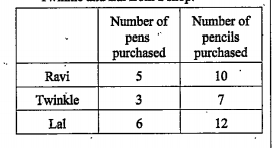The probability that Satish solves a problem is 1/2 and probability that Gayathri solves the problem is 1/3. If both try to solve the problem independently, find the probability that, Satish will not solve the problem.Solution in Malayalam
Step by step video & image solution for The probability that Satish solves a problem is 1/2 and probability that Gayathri solves the problem is 1/3. If both try to solve the problem independently, find the probability that, Satish will not solve the problem. by Maths experts to help you in doubts & scoring excellent marks in Class 12 exams.
Updated on:21/07/2023Topper's Solved these Questions
Similar Questions
Consider the following information regarding the purchase of pens and penciles by the three students Ravi, Twinkle and Lal from a shop.
 Represent the above data in the form of a 3×2 matrix. What does the entry in the 2nd row and in the first column represent?
Represent the above data in the form of a 3×2 matrix. What does the entry in the 2nd row and in the first column represent?
View SolutionLet A be the set of all 50 students of class X in a school. Let f:A→N
be function defined by f(x) = roll numbers of the student x. Show that
f is one-one but not onto
View SolutionProbability of solving specific problem independently by A and B are 12and 13respectively. If both try to solve the problem independently find the probability that(i) the problem is solved (ii) exactly one of them solves the problem.
View SolutionProbabilities of solving a specific problem independently by A and B are 12 and13 respectively. If both try to solve the problem independently, find the probability that (i) the problem is solved (ii) exactly one of them solves the problem.
View SolutionProbability of solving specific problem independently by A and B are 12 and 13 respectively. If both try to solve the problem independently, find the probability that (i) the problem is solved (ii) exactly one of them solves the problem.
View SolutionThe probabilities that A and b can solve a problem independently are 13 and 16 respectively. If both try to solve the problem independently, find the probability that:
(i) problem will be solved
(ii) both can solve the problem.
View SolutionProbability of solving problem independently by A and B are respectively. If both try to solve the problem independently, find the probability the problem is solved.
View SolutionThe probability of solving a specific problem independently by A and B are 13 and 15 respectively. If both try to solve the problem independently, find the probability that the problem is solved.
View SolutionA and B try to solve the problem independently. The probability that A solves the problem is 12 and that B solves the problem is 13. Find the probability that :
(a) Both of them solve the problem
(b) The problem is solved.
View SolutionProbability of solving specific problem independently by A and B are 12 and 13 respectively. If both try to solve the problem independently, find the probability that :
(i) the problem is solved
(ii) exactly one of them solves the problem.
View SolutionThe probabilities of A and B solving a problem independently are13and14respectively. If both of them try to solve the problem independently, what is the probability that the problem is solved?
View SolutionA and B try to solve a problem independently Probability that A solves the problem is 13 and that B solves the problem is 14. Find the probability that
i. Both of them solve the problem.
ii. The problem is solved.
View SolutionProbability of solving specific problem independently by A and B are 12 and 13 respectively. If both try to solve the problem independently, find the probability that (i) the problem is solved (ii) exactly one of them solves the problem.
View SolutionProbability of solving a specific problem independently by A and B are 12 and 13 respectively. If both try to solve the problem independently, then find the probability that the problem is solved ?
View SolutionA and B try independently to solve a problem. probability that A solves it is 13 & that B is 35. Find the probability that the problem is solved.
View Solution
